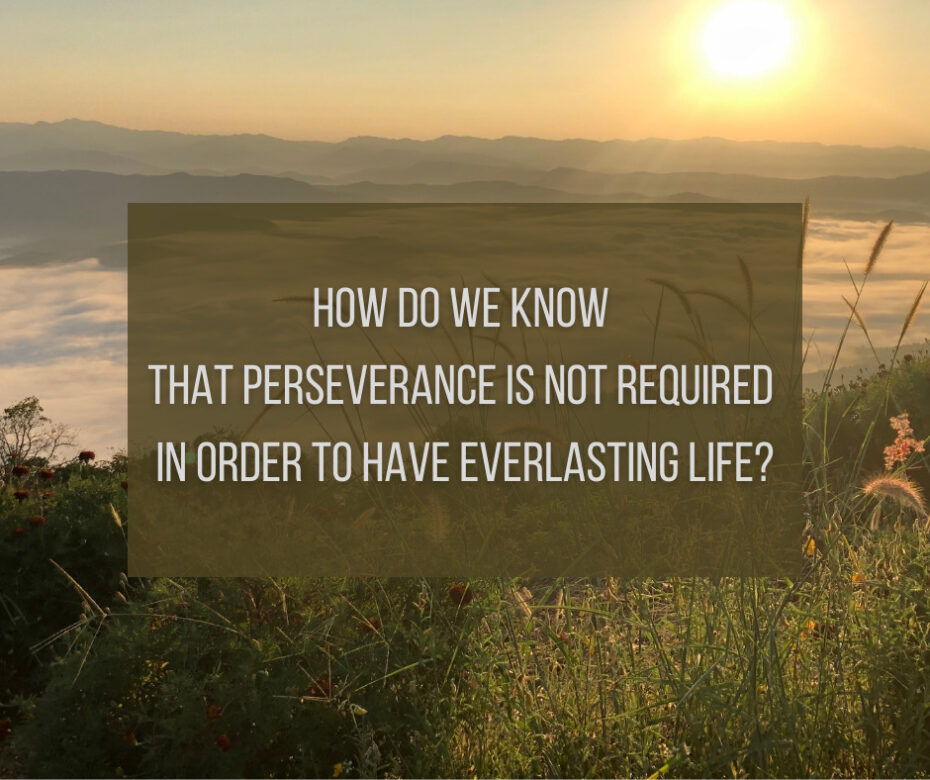J. H. asks a great question about whether all believers at least in some sense persevere in faith and good works until death:
As far as I know, you (in GES) are the only people in Christendom who don’t hold to the perseverance of the saints in any capacity, even teaching that a believer can stop believing and still go to heaven. It seems to me that 2 Timothy 2:13 supports the idea that a believer can stop believing, but there are other verses that seem to say a Christian will (or must) have certain characteristics. In addition, there are other verses that seem to suggest there are sins which a Christian is incapable of committing.
I’m on the fence as far as complete apostasy is concerned, but I do believe a believer could stray from the tenets of the faith and become a Catholic, Orthodox, even a Mormon, etc.
Here are the verses [from John’s Gospel] that make me hesitant: John 3:18, 36; 8:47; 10:4; 14. [Also] Mark 3:29 and Rev 22:19.i
Essentially, J. H. has asked eight questions, the general one about perseverance and then seven questions about specific passages. I will answer his question in four parts. In part one, I will discuss the general question. Then in parts 2-4, I will discuss the seven verses he mentions.
It is true that most people in Christianity, including most Protestants, Catholics, Orthodox, Calvinists, Arminians, and the cults, all believe that perseverance is required to get into Christ’s kingdom (often called final salvation). However, it is not true that most believe that perseverance is guaranteed. Since most people in Christianity believe that everlasting life can be lost, they believe that perseverance is required to keep your salvation. Arminians believe that failure to persevere is quite possible.
Oddly enough, most Calvinists also believe that perseverance is not guaranteed. While most Calvinists say that no true believer will fail to persevere, they say (with rare exceptions) that we cannot be sure that we truly believe. Hence most Calvinists teach that you must persevere in order to get what they call final salvation.
It is extremely rare to find someone claiming to be a Christian who says that he knows he will persevere in faith and good works until death. After all, if Paul himself could not say that—see 1 Cor 9:27—until he knew he was about to be martyred (2 Tim 4:6-8), then neither can we. That is why, by the way, very few people in Christianity claim to be certain that they have everlasting life that can never be lost. Only if we recognize that perseverance is not required to retain everlasting life or to prove that we have it can we be sure of our salvation.
So how do I know that perseverance is neither guaranteed nor required to maintain everlasting life?
First, all of the warning passages in the NT show that perseverance is not guaranteed. See, for example, Matt 24:45-51; 25:1-13, 14-30; Luke 19:16-26; 1 Cor 9:24-27; Gal 5:4; Col 1:21-23; 2 Tim 2:12, 4:9-10; Heb 2:1-4; 3:1–4:16; 6:4-8; 10:26-31; 12:25-29; Jas 5:19-20; 2 Pet 2:18-22; 1 John 2:28; 4:17-19; 2 John 7-11; 3 John 9-12; Rev 2:5-6, 10, 16, 25-29; 3:3-5, 11-12, 19-21.
Second, all of the over 100 faith-alone verses in the Bible show that perseverance is not required (e.g., John 3:16; 5:24; 6:35, 47; 11:25-27; 20:31; Acts 16:31; Eph 2:8-9; Rev 22:17). None of those verses say that the one who perseveres in faith will have everlasting life when he dies. They all say that whoever believes in Jesus has everlasting life right now that cannot be lost. So, if J. H. or I or anyone else believes in Jesus for everlasting life today, then he is secure forever. In fact, anyone who ever believed in Jesus is secure forever because John 3:16 is true the moment one believes.
Third, since Scripture cannot contradict Scripture, then we know that none of the warning passages are warning believers that if they fail to persevere then they will end up being eternally condemned.
I don’t know if I will persevere or not. I pray that I will. But I do know that I have everlasting life that can never be lost. And I thank God for that often! In fact, my certainty of my eternal destiny is a crucial motivation for me to persevere.
__________
i J. H. wrote a few sentences about each verse explaining why he thought it taught perseverance to a degree. I will put in his questions about each verse as I discuss them.


